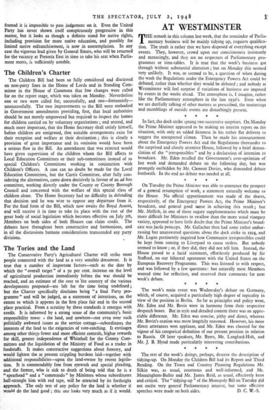The Children's Charter
The Children Bill had been so fully considered and discussed on non-party lines in the House of Lords and in Standing Com- mittee in the House of Commons that few changes were called for on the report stage, which was taken on Monday. Nevertheless one or two were called for, successfully, and one—fortunately- unsuccessfully. The two improvements to the Bill were embodied in Government amendments providing, first, that local authorities should be not merely empowered but required to inspect the homes for children carried on by voluntary organisations ; and second, and much more important, that the Home Secretary shall satisfy himself, before children are emigrated, that suitable arrangements exist for their reception and welfare at their destination ; this is clearly a provision of great importance and its omission would have been a serious flaw in the Bill. An amendment that was rejected would have given supervision of the children whom the Bill affects to Local Education Committees or their sub-committees instead of to special Children's Committees working in conjunction with Children's Officers. A case can no doubt be made for the Local Education Committees, but the Curtis Committee, after fully con- sidering the alternatives, came down decisively in favour of an ad hoc committee, working directly under the County or County Borough Council and concerned with the welfare of this special class of children alone. The Home Secretary had no difficulty in defending that decision and he was wise to oppose any departure from it. For the final form of the Bill, which now awaits the Royal Assent, and will receive it in time to take its place with the rest of the great body of social legislation which becomes effective on July 5th, Members on both sides of both Houses can claim credit. The debates have throughout been constructive and harmonious, and in all the discussions humane considerations transcended any party divisions.






































 Previous page
Previous page